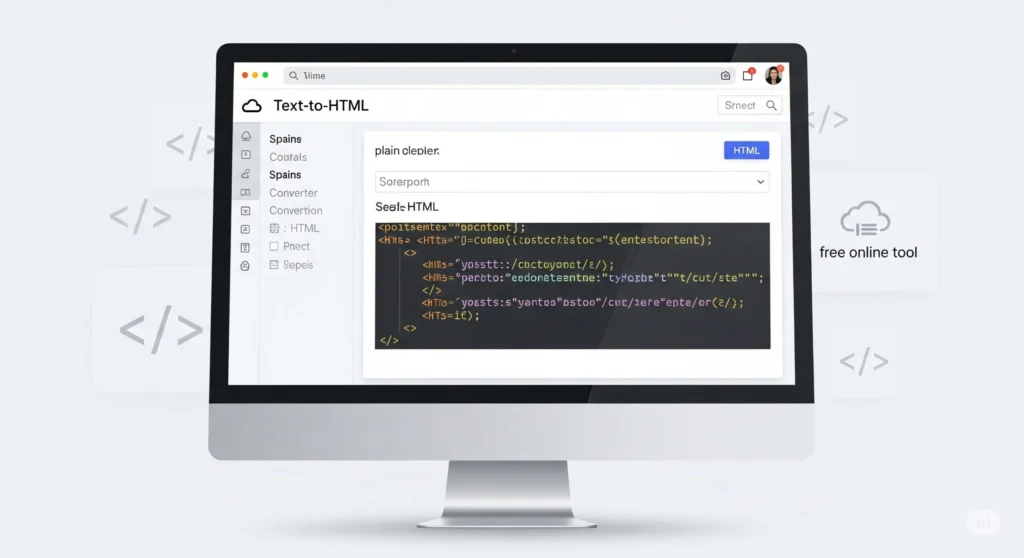Instantly convert any text into perfect camelCase with our free online Text to camelCase converter. Ideal for developers and programmers. Fast, accurate, and supports multiple case styles. Boost your productivity and ensure code consistency today!
You’ve probably been there. You’re deep in a coding session, your focus is sharp, and you’re building something amazing. Then, you need to name a new variable. You have a descriptive phrase like “user first name,” but how do you turn that into a single, valid variable name? Manually deleting the spaces and capitalizing the “f” and “n” seems simple enough. But do it a hundred times a day, and it becomes a tedious, error-prone chore that breaks your concentration.

Inconsistent naming conventions are more than just a minor annoyance; they are a notorious source of bugs, a barrier to collaboration, and a drain on productivity. This is where a powerful, reliable, and free online Text to camelCase converter becomes an indispensable part of any modern developer’s toolkit.
We’ve designed the ultimate tool to solve this exact problem. It’s more than just a converter; it’s a productivity booster built for professionals. Whether you’re formatting JSON keys, declaring variables in JavaScript, or ensuring your project adheres to strict style guides, our tool provides instant, accurate conversions, allowing you to maintain focus on what truly matters: writing exceptional code.
How to Use Our Powerful Text to camelCase Converter
Simplicity and power are at the core of our tool’s design. Getting perfectly formatted text is as easy as a copy-paste. Here’s how to get started in seconds:
- Input Your Text: In the left-hand input box, type or paste the text you want to convert. This can be anything from a simple “hello world” to a long sentence like “a comprehensive guide to user authentication.” Our tool can handle multiple lines and various separators like spaces, hyphens (
-), and underscores (_). - Choose Your Case Style: While the default is camelCase, our versatile tool also supports other essential programming case styles. You can instantly switch to:
- PascalCase (or UpperCamelCase):
MyVariableName - snake_case:
my_variable_name - kebab-case:
my-variable-name
- PascalCase (or UpperCamelCase):
- Instantly Get the Result: The moment you input text, the converted output appears in the right-hand box. There’s no “submit” button to press, no delay. The conversion happens in real-time, streamlining your workflow.
- Copy and Clear: With a single click on the “Copy to Clipboard” button, the result is ready to be pasted directly into your code editor. Need to start over? The “Clear All” button resets the tool for your next conversion.
The primary benefit is clear: it saves you time and eliminates manual errors. By automating this repetitive task, you ensure 100% consistency across your entire project, which is a cornerstone of professional, maintainable code.
What Exactly Is camelCase? A Deep Dive for Developers
For seasoned programmers, camelCase is second nature. But for those new to coding or working across different technology stacks, understanding its nuances is crucial. At its heart, camelCase is a naming convention where words in a phrase are joined together without spaces, with the first letter of each word—except for the very first one—capitalized.
The name comes from the “humps” of the capital letters in the middle of the word, resembling the back of a camel.
There are two primary variants of camelCase:
- lowerCamelCase: This is the most common form and what people usually mean when they say “camelCase.” The very first letter of the entire phrase is lowercase. It’s the standard for naming variables and functions in many of the world’s most popular programming languages.
"user first name"becomesuserFirstName"create new http request"becomescreateNewHttpRequest
Example in JavaScript:
JavaScriptlet userProfileData = {}; function getUserProfileById(userId) { // function logic here } - UpperCamelCase (PascalCase): In this variant, the first letter of every word, including the first one, is capitalized. While technically a form of camelCase, it has a distinct name and purpose. It is overwhelmingly used for naming constructs that are meant to be “instantiated” or serve as “blueprints,” such as classes, interfaces, types, and components.
"user profile component"becomesUserProfileComponent"http request handler"becomesHttpRequestHandler
Example in React:
JavaScriptclass UserCard extends React.Component { // class logic here } // Or as a functional component function MainLayout() { // component logic here }
Our Text to camelCase tool seamlessly supports both lowerCamelCase and PascalCase, allowing you to choose the precise format you need for any given context.
Why Consistent Naming Is a Non-Negotiable in Modern Software Development
Using a tool to convert your Text to camelCase might seem like a small optimization, but it enforces a principle that separates amateur code from professional, enterprise-grade software: consistency. A consistent naming convention is the silent bedrock of a healthy codebase. Here’s why it’s so critical.
Readability and Maintainability
Code is read far more often than it is written. Your collaborators (and your future self) will thank you for clear, predictable variable names. When every function is in camelCase and every class is in PascalCase, the code becomes self-documenting. It reduces cognitive load, allowing developers to understand the purpose of a piece of code at a glance without having to hunt down its declaration. As explained by software engineer Robert C. Martin in his seminal book Clean Code, a significant part of writing clean code is choosing good names.
Seamless Collaboration
Imagine a team project where one developer uses user_id, another uses userID, and a third uses UserId. This chaos inevitably leads to bugs that are frustratingly difficult to trace. By establishing and enforcing a single standard—often with the help of linters and a reliable converter—teams can work on the same codebase frictionlessly. A shared convention is a shared language.
Simplified Debugging
When you encounter a bug, one of the first steps is to trace the flow of data through variables and functions. If you know that activeUser is a variable and ActiveUser is a class, you can immediately rule out certain types of errors. Inconsistent naming forces you to constantly second-guess the nature of every identifier, turning a 10-minute debugging session into an hour-long ordeal.
Adherence to Language and Framework Standards
Most programming languages and frameworks have strongly recommended style guides.
- JavaScript (and TypeScript): The community, along with influential style guides like the Airbnb JavaScript Style Guide, heavily favors
camelCasefor variables/functions andPascalCasefor classes. - Java: The official convention is
camelCasefor methods and variables, andPascalCasefor class names. - Swift & Kotlin: These modern mobile development languages also follow the
camelCaseandPascalCaseparadigm.
Using a Text to camelCase generator ensures you are effortlessly compliant with these widely accepted standards, making your code more idiomatic and easier for others in the community to read and contribute to.
Beyond camelCase: Understanding Other Common Case Styles
While camelCase is dominant in many areas, a professional developer must be fluent in other case styles, as they are prevalent in different contexts. Our tool is a comprehensive case converter, equipping you for any situation.
snake_case
In snake_case, all words are lowercase and separated by an underscore (_).
- Example:
user_first_name,api_key_secret - Common Uses:
- Python: It’s the standard convention (PEP 8) for variable and function names.
- Databases: Often used for table and column names in SQL (e.g.,
product_orders). - Older C/C++ code: You’ll frequently find it used for constants (e.g.,
MAX_CONNECTIONS).
kebab-case
In kebab-case (also known as spinal-case or dash-case), all words are lowercase and separated by a hyphen (-).
- Example:
user-first-name,main-content-wrapper - Common Uses:
- URLs: It’s considered the most SEO-friendly way to format URL slugs (e.g.,
/blog/my-first-post). - CSS: It’s the standard for naming CSS classes and IDs (e.g.,
.nav-bar,#header-logo). - Configuration files: Often used for keys in YAML or other config formats.
- URLs: It’s considered the most SEO-friendly way to format URL slugs (e.g.,
Quick Comparison Table
| Case Style | Example Input | Converted Output | Primary Use Case |
| camelCase | convert text case | convertTextCase | JS/Java Variables, Functions |
| PascalCase | convert text case | ConvertTextCase | Classes, Components, Types |
| snake_case | convert text case | convert_text_case | Python, SQL Columns |
| kebab-case | convert text case | convert-text-case | URLs, CSS Classes |
Practical Applications: Where Our Text to camelCase Tool Shines
This converter is more than a theoretical exercise. Here are some real-world scenarios where it will become your go-to utility.
- JavaScript/TypeScript Development: You’re fetching data from an API that returns keys in
snake_case(e.g.,{"user_id": 123, "display_name": "John"}). Before using this data in your JS code, you’ll want to convert the keys tocamelCase(userId,displayName) to match your codebase’s convention. Our tool makes this data transformation trivial. - Building JSON Payloads: When you send data to an API, it often requires a specific format. If the API expects
camelCasekeys, you can write your object structure using descriptive, spaced-out text and then convert the keys in one go, ensuring your payload is valid. - Writing Configuration Files: Quickly convert human-readable setting names like “database connection string” into a programmatic format like
databaseConnectionStringfor your.envor JSON config files. - For Content Creators and SEOs: While
kebab-caseis the king of URLs, having a tool that can quickly switch between formats is useful when managing data for different platforms.
Manual Conversion vs. The Efficiency of a Tool
Is it possible to convert text manually? Of course. But the real question is, should you?
| Aspect | Manual Conversion | Using Our Text to camelCase Tool |
| Speed | Slow and methodical. Requires typing, deleting, and capitalizing. | Instant. Real-time conversion as you type. |
| Accuracy | Prone to human error. A missed capitalization or a typo is common. | 100% Accurate. Algorithmic conversion ensures flawless output every time. |
| Mental Load | Distracting. It breaks your “flow state” and forces you to think about a menial task. | Effortless. Frees up your mental energy to focus on complex problem-solving. |
| Edge Cases | Struggles with complex inputs like mixed cases (Text_with-DIFFERENT cases). | Robust. Handles mixed separators, numbers, and existing capitalization intelligently. |
| Cost | “Free” in terms of money, but costs you valuable time and focus. | Completely Free. No cost, no sign-up, no limits. |
Investing in tools that automate repetitive tasks is a hallmark of an efficient and effective developer. Our converter is one such tool, designed to give you back your most valuable assets: time and focus.
Your Go-To Resource for Code Consistency
In the fast-paced world of software development, efficiency and consistency are paramount. Manually formatting variable names is a relic of the past—a time-consuming and error-prone task that no longer needs to be part of your workflow.
By bookmarking and using our free online Text to camelCase converter, you’re not just adopting a utility; you’re embracing a philosophy of clean, maintainable, and professional coding. It’s a simple step that pays huge dividends in productivity, code quality, and collaboration. Make it a permanent part of your development process and spend less time on formatting and more time building the future.
Frequently Asked Questions (FAQ)
What is the main difference between camelCase and PascalCase?
The key difference lies in the very first letter. In lowerCamelCase (the standard camelCase), the first letter is lowercase (e.g., myVariable). In UpperCamelCase, also known as PascalCase, the first letter is also capitalized (e.g., MyVariable). PascalCase is typically reserved for naming classes, components, or types, while camelCase is used for variables and functions.
Is this Text to camelCase tool completely free to use?
Yes, absolutely. Our tool is 100% free to use, with no usage limits, no subscriptions, and no need to sign up. It’s a community resource built for developers to improve their daily workflow.
Why can’t I use spaces in variable names in most programming languages?
Programming language parsers (the tools that read your code) use spaces to separate distinct tokens, such as keywords, operators, and identifiers (variable names). If spaces were allowed within a variable name like my variable, the parser would see it as two separate identifiers, “my” and “variable,” leading to a syntax error. Case styles like camelCase solve this by creating a single, unbroken token.
Which popular programming languages use camelCase?
camelCase is one of the most widespread conventions. It’s the standard in JavaScript, Java, TypeScript, C# (for local variables), Swift, and Kotlin, among others. Its prevalence in the JavaScript ecosystem, which powers the modern web, makes it particularly important for web developers.
Does this online converter store any of the text I input?
No. We prioritize your privacy and security. All conversions happen directly in your browser using JavaScript. None of the data you type or paste into the tool is ever sent to or stored on our servers. Your information remains completely private.


